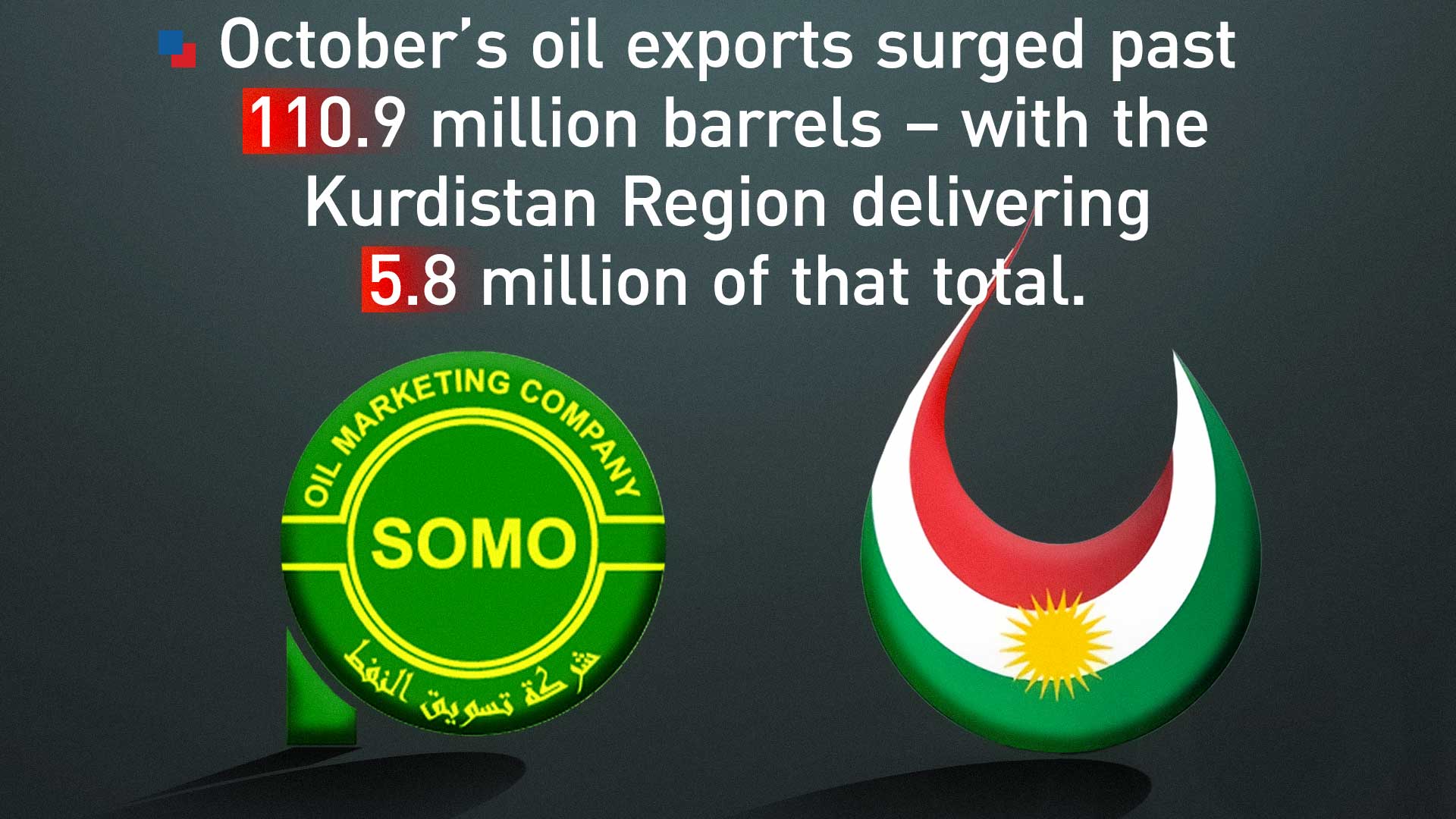SOMO Reports Over 110 Million Barrels Exported in November as Kurdistan Crude Reclaims Strategic Role
Nearly 6 million barrels of Kurdistan Region oil shipped through Türkiye’s Ceyhan port amid renewed U.S. backing for a stable export deal

ERBIL (Kurdistan24) — Iraq’s State Oil Marketing Organization (SOMO) announced on Tuesday that the country exported 110,923,047 barrels of crude oil in October, with newly resumed exports from the Kurdistan Region once again appearing prominently in national figures. The data underscores the growing centrality of Kurdish crude to Iraq’s overall export mix at a time when the United States is pushing for a long-term, uninterrupted energy arrangement involving the Kurdistan Region, Baghdad, and SOMO.
According to SOMO, Basra oil fields accounted for 104,816,106 barrels, forming the backbone of Iraq’s export volume. But critically, the statement confirmed that oil from the Kurdistan Region exported through Türkiye’s Ceyhan port totaled 5,834,864 barrels, marking a significant monthly return since the Region resumed exports in late September after a 2.5-year halt. Crude from Kirkuk fields exported to Jordan amounted to 272,077 barrels.
SOMO also reported October revenues of $7.030 billion, reflecting continued global demand as Kurdish crude re-enters international markets under the new tripartite framework.
Kurdish Exports Strengthen Under U.S.-Backed Tripartite Agreement
The renewed presence of more than 5.8 million barrels of Kurdish crude in SOMO’s monthly totals comes amid Washington’s active support for ensuring the continuity of the trilateral oil export arrangement between the Kurdistan Regional Government (KRG), the Iraqi federal government, and SOMO.
During a high-level meeting in Erbil on Tuesday, U.S. Chargé d’Affaires Joshua Harris and U.S. Consul General Wendy Green reaffirmed Washington’s position that Kurdistan Region crude exports are of “strategic importance” and must remain stable, durable, and protected from political disruption.
The KRG’s acting Minister of Natural Resources, Kamal Mohammed, underscored that both sides are committed to strengthening this arrangement, which has restored steady oil flows to global markets.
U.S. officials expressed satisfaction with the KRG’s steps to increase production and maintain the technical continuity of exports, emphasizing that the uninterrupted flow of crude is essential not only for Iraq’s and Kurdistan’s economic stability but also for broader energy security.
Exports Resume After 2.5 Years, Feeding a 600 km Lifeline to Ceyhan
Kurdistan Region oil exports officially resumed in late September after a prolonged, Baghdad-imposed halt widely seen as political pressure aimed at curbing the Region’s economic autonomy.
Under the current deal, Kurdistan’s fields produce around 240,000 barrels per day, with 190,000 barrels allocated for export and 50,000 barrels reserved for domestic consumption. All crude is transported to Peshkabour and then funneled through Türkiye to the Ceyhan port.
The export pipeline—stretching nearly 600 kilometers—now operates under a shared responsibility system. The KRG manages transport up to Peshkabour. Türkiye oversees the pipeline to Ceyhan. At Ceyhan, SOMO receives the crude and assumes control of global marketing.
SOMO has contracted a major Swiss trading company to market the oil, with shipments bound for Europe, North America, and other destinations.
New Volume Calculations for the 2026 Budget
While the tripartite agreement currently spans three months, Iraqi and Kurdish officials anticipate recalibrating export volumes for Iraq’s 2026 federal budget, aligning them with the Kurdistan Region’s production capacity and global market demand.
For now, October’s figures show that Kurdish crude—nearly 6% of SOMO’s total exports for the month—has rapidly regained its strategic weight.
As U.S. officials continue to advocate for an uninterrupted flow, the Kurdistan Region’s oil once again forms a critical component of Iraq’s economic engine and a vital link in the region’s broader energy security landscape.